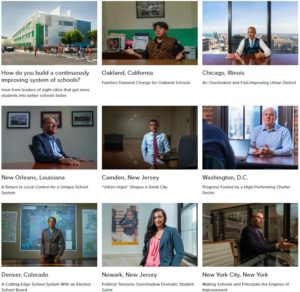 Bellwether took a look at the stories of eight cities innovating with what’s often called the “portfolio model” of schools and built a website to tell those stories.
Bellwether took a look at the stories of eight cities innovating with what’s often called the “portfolio model” of schools and built a website to tell those stories.
Max Marchitello on Arizona pensions. Spoiler alert, not an optimal retirement plan! (That’s not financial advice, just common sense based on how it works and how life works).
While the Red Sox were breaking through the Dodgers’ pitching, Chad Aldeman stayed focused and live tweeted the PBS pension special.
David Leonhardt suggests that people don’t double-major in college. I’m not sure this is good advice or at least not good advice too broadly applied.
When you look at the number of courses and credit hours it takes to major relative to the number it takes to earn a four-year degree you see a pretty substantial gap at most schools. This is the cleavage that varies boot camps and other non-traditional approaches are trying to leverage open.
On campus, at its strongest, that gap is filled by taking a wide range of courses that give someone a broad education so when they hear a reference to a foundational idea or event they get it and they know a little about the world beyond the end of their nose. That short of shared knowledge is out of fashion in our tribal and exhausting first person times, but it’s nonetheless pretty vital to a country that celebrates both the pluribus and the unum. And it does. The overall political landscape is thankfully not as radicalized as media, social media, and our political class make it out to be.
Yet at its worst, and largely the norm in higher ed, students take a bunch of classes that don’t really hang together or study an awful lot of critical this and critical that without ever engaging in the underlying content and ideas they are supposed to be critical of. So it’s sort of a mish mash. Up against that, and the number of courses you have to take, a second major can make a lot of sense. You can learn more about something that interests you (full disclosure this is what I did). You can also do this and still take some of the random electives that make college interesting and fun and expose you to ideas and areas of learning you might otherwise not know about.
For sure, a second major should be a passion or interest project, not a credentialing one. Leonhardt is absolutely right that the credentialing arms race and its side effects are out of hand. But when hiring, I find the resume from the person who studied both a hard science and English or engineering and history an appealing one. While not dispositive at all, they are at least slightly more likely to be able to think about the world with a bit more texture and have interesting analogies to bring to bear on the problems we’re trying to solve.
Elsewhere:
This would have an impact on schools.
This could have an impact on your car, driverless school buses being surreptitiously tested.
“Maine schools quickly faced hurdles…”
Some education implications to this election, so you should pay attention to the “Full Rhode Island.”

Excellent data sir. Nice piece of sharing this article. I bookmarked this page. Iam waiting more information about on it. Iam keep in touch. Thank You
As I entered college I thought it was all figured out. Being an African American History teacher was going to be my career path. After completing my freshman year, I then realized my interest spread across multiple areas. I knew that whatever I studied need to help me spark my areas of interest, I love learning, and I love helping people. When I found the Education and Public Policy program here at Penn State it was able to integrate all of my interests. I am now able to take course across both the college of education, as well as the college of liberal arts. With this major it is required that we blend our coursework to include policy problems, public systems, leadership, ethics, diversity, equality, and equity. This choice in major has given me the opportunity to explore different ways to impact public school in Philadelphia, without facilitating a classroom. This path has given me the ability to give to school environments without receiving that teaching certificate after graduation. I plan to use my extensive course work in political science and sociology coursed to help make Philadelphia public schools better places for students of color.